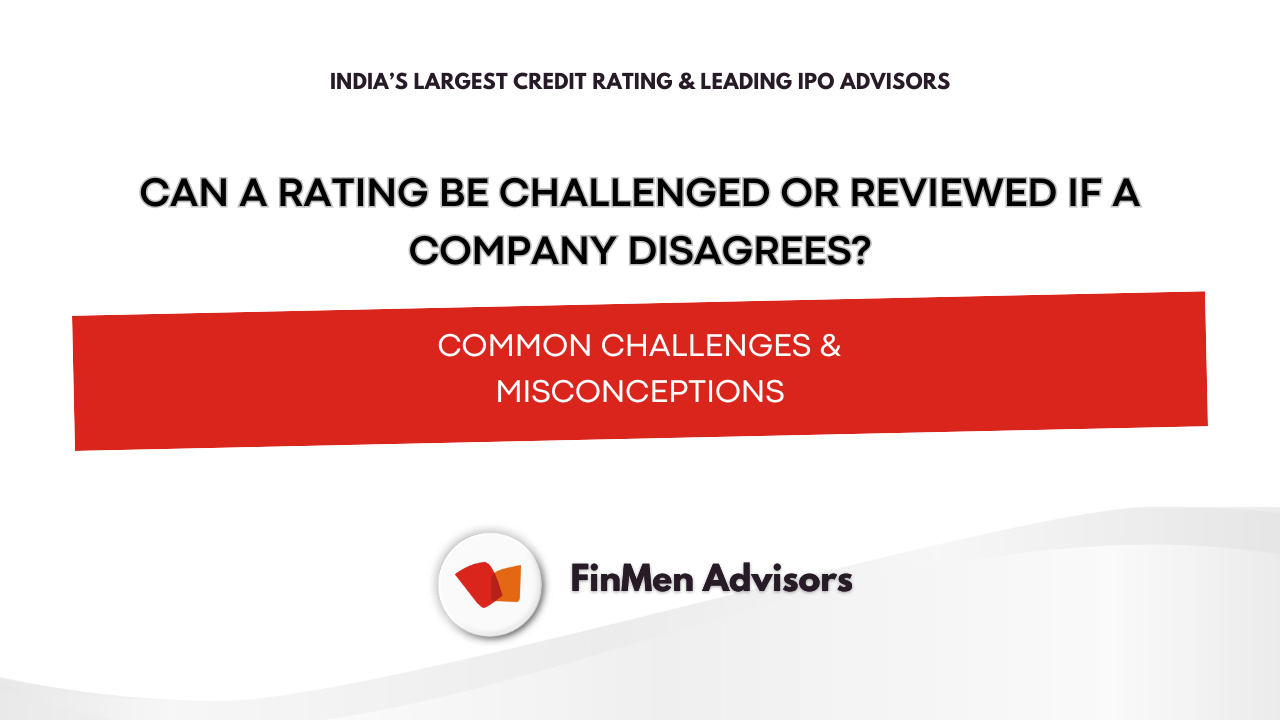Credit ratings hold significant influence over a company’s financial credibility and borrowing capacity. They impact how lenders, investors, and business partners perceive an organization’s ability to meet its obligations. But what happens when a company believes that its credit rating doesn’t accurately reflect its true financial position or risk profile? Can it challenge or request a review of the rating?
The short answer is yes — credit ratings can be reviewed, appealed, or reassessed under defined procedures set by rating agencies. However, doing so effectively requires understanding how the rating process works, what grounds are valid for a review, and how expert guidance can make a difference.
Understanding the Credit Rating Process
Credit rating agencies such as CRISIL, ICRA, CARE, India Ratings, and Brickwork assess a company’s financial health based on various factors, including:
- Financial performance (profitability, leverage, liquidity, cash flows)
- Business model and industry position
- Management quality and governance standards
- Market conditions and peer comparison
Once an agency completes its analysis, it assigns a rating along with a rationale document explaining the key strengths, weaknesses, and assumptions behind the assigned grade.
A company may sometimes feel that the assigned rating does not truly reflect its fundamentals — perhaps because of outdated data, recent performance improvements, or misinterpretation of business nuances.
When Can a Rating Be Challenged?
A company may request a review or appeal in several scenarios, such as:
- Material Changes Post-Assessment – If there have been improvements in financial metrics, new contracts secured, debt repayment, or promoter equity infusion after the assessment.
- Incorrect or Incomplete Data Considered – If the rating was based on outdated or partial information.
- Misinterpretation of Industry or Business Model – If the unique risk-mitigating aspects of the business were not adequately understood.
- Market or Regulatory Shifts – If there have been structural changes in the sector impacting overall risk levels.
In these cases, the company can formally request a review from the rating agency, supported by new evidence or documentation.
The Review Process Explained
Each rating agency follows its internal policy for appeals, but typically the process includes:
- Formal Request Submission – The company submits a review request with justifications and supporting documents.
- Review Committee Evaluation – An independent review committee (separate from the original rating team) re-examines the case.
- Additional Clarifications – The agency may request further clarifications or data before making a final decision.
- Outcome Communication – If the review committee finds merit in the appeal, the rating may be upgraded, reaffirmed, or maintained with revised rationale.
It’s important to note that the outcome depends on the strength of the evidence presented and the agency’s independent evaluation.
Common Misconceptions About Challenging Ratings
- It’s Not About Negotiation – A review is not a negotiation for a higher rating; it is a structured re-evaluation based on facts and data.
- Reviews Don’t Guarantee an Upgrade – Agencies operate under strict independence and may reaffirm the rating if new evidence doesn’t materially alter their assessment.
- Timing Matters – A review is more effective if initiated soon after the rating release, before the next surveillance cycle.
How Credit Rating Advisory Firms Can Help
For many companies — especially SMEs and first-time rating participants — the process of challenging a rating can seem complex. A credit rating advisory firm like FinMen Advisors helps businesses in:
- Analyzing the rating rationale to identify valid grounds for review.
- Preparing detailed representation with financial evidence and contextual explanations.
- Engaging with the rating agency through structured communication.
- Ensuring that the company’s perspective and improvements are clearly presented.
With a strategic approach, businesses can often secure a more accurate and fair representation of their creditworthiness.
Why It’s Worth Pursuing a Review
A single rating notch can significantly affect borrowing costs, investor perception, and even eligibility for tenders or credit facilities. Hence, if a company genuinely believes its rating does not align with its fundamentals, seeking a review is not only justified but also strategically important.
A transparent, data-backed, and well-documented approach — guided by expert advisors — can turn a potentially unfavorable rating into a fair reflection of true business strength.
In Conclusion
Yes, ratings can be challenged or reviewed — but success depends on understanding the process and presenting compelling evidence. Independent credit rating agencies value objectivity, and when companies engage systematically with professional support, they often find that the system allows for fairness and correction where warranted.
In today’s data-driven financial ecosystem, knowing your right to seek a review — and using it wisely — can make all the difference between being undervalued and being truly recognized for your financial strength.


